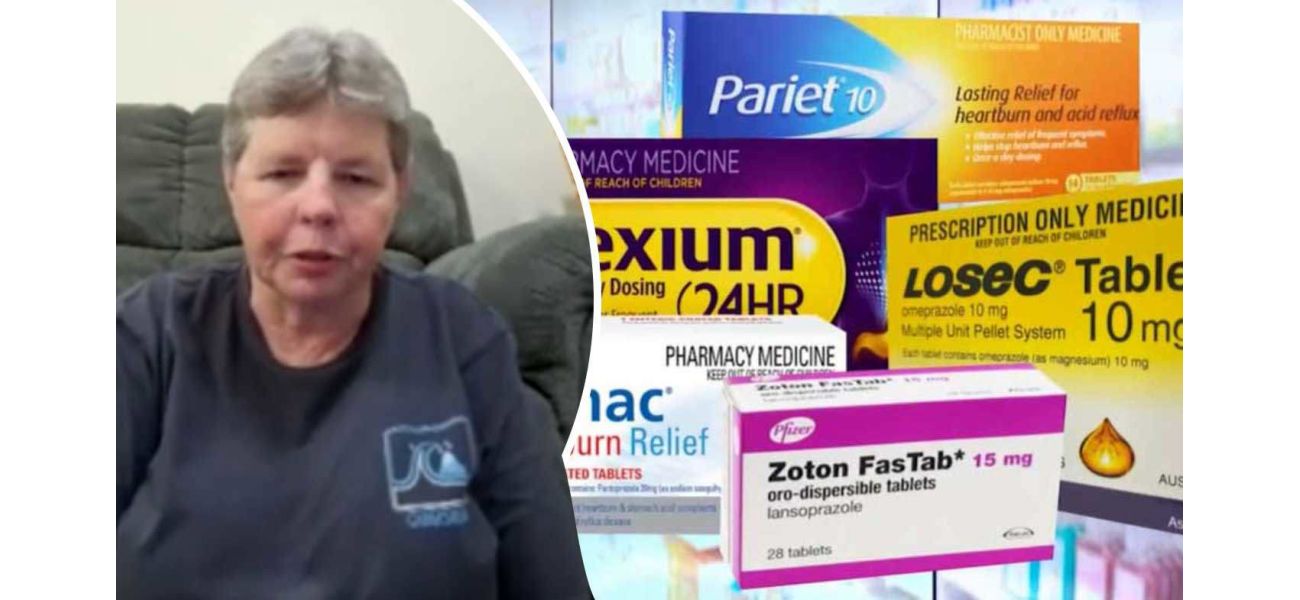Law firm explores class action lawsuit for widely used heartburn medication.
Donna Johnstone has chronic kidney disease from using a common reflux medication for two decades.
September 8th 2024.

Donna Johnstone's experience with reflux began more than two decades ago. She sought help from her doctor who prescribed her a medication called Somac, which is a type of proton pump inhibitor that helps decrease acid production in the stomach. To her surprise, the medication worked wonders and she had no symptoms of reflux. She was relieved and continued taking the medication for the next 20 years.
However, in 2018, Johnstone started experiencing severe kidney problems. She had multiple kidney stones and her kidney function had dropped to 19 percent. This was shocking news to her as she had not experienced any symptoms before. If it weren't for routine blood tests, she would not have known about her low kidney function until it was too late and she would have had to undergo dialysis. Upon consulting a specialist, she was informed that the cause of her kidney issues was the heartburn medication, and she was advised to stop taking it.
Proton pump inhibitors like Somac have been widely prescribed since the 1990s for treating heartburn and reflux. However, recent concerns have arisen about the potential link between these medications and kidney problems and gastric cancers. AstraZeneca, a pharmaceutical company, paid a hefty sum of $630 million in a US lawsuit settlement to almost 19,000 patients who claimed that two proton pump inhibitors, Nexium and Prilosec, caused their chronic kidney disease. This has led to Shine Lawyers investigating the possibility of a class action lawsuit against the manufacturers of proton pump inhibitors still available in Australia, including Nexium, Losec, Somac, Pariet, and Zoton.
Craig Allsopp, Joint Head of Class Actions at Shine Lawyers, stated that PPI drugs have been incredibly popular, with over 5 million Australians filling prescriptions for them in the past four years alone. The number of individual prescriptions has been increasing every year, with over 23 million filled in 2021. Shine Lawyers, along with US class action specialist firm Milberg Coleman Bryson Phillips Grossman, will be looking into the latest research on these medications, which suggests an increased risk of stomach cancers and kidney injuries. Allsopp also highlighted that consumers typically take PPIs for longer periods and at higher doses than recommended, making the potential risks even more concerning.
Johnstone, who now lives with chronic kidney disease, expressed her willingness to participate in a class action lawsuit if it moves forward. Although her kidney function has improved with medication, it is still only at 60 percent. She shared her concerns about her future, especially as a mother to a 10-year-old special needs child, knowing that she may not live to see him grow up due to the kidney disease she developed from taking the medication. She also mentioned that her doctor did not warn her of any potential side effects when prescribing the medication, and she feels let down and deceived.
A spokesperson for Takeda Pharmaceuticals, the manufacturers of Somac, declined to comment on any potential or ongoing litigation. Johnstone's story serves as a cautionary tale for the thousands of Australians who have taken or are currently taking proton pump inhibitors for heartburn and reflux. As more research is conducted on the potential risks of these medications, it is important for doctors to inform their patients of all possible side effects and for pharmaceutical companies to be transparent about the potential dangers of their products.
However, in 2018, Johnstone started experiencing severe kidney problems. She had multiple kidney stones and her kidney function had dropped to 19 percent. This was shocking news to her as she had not experienced any symptoms before. If it weren't for routine blood tests, she would not have known about her low kidney function until it was too late and she would have had to undergo dialysis. Upon consulting a specialist, she was informed that the cause of her kidney issues was the heartburn medication, and she was advised to stop taking it.
Proton pump inhibitors like Somac have been widely prescribed since the 1990s for treating heartburn and reflux. However, recent concerns have arisen about the potential link between these medications and kidney problems and gastric cancers. AstraZeneca, a pharmaceutical company, paid a hefty sum of $630 million in a US lawsuit settlement to almost 19,000 patients who claimed that two proton pump inhibitors, Nexium and Prilosec, caused their chronic kidney disease. This has led to Shine Lawyers investigating the possibility of a class action lawsuit against the manufacturers of proton pump inhibitors still available in Australia, including Nexium, Losec, Somac, Pariet, and Zoton.
Craig Allsopp, Joint Head of Class Actions at Shine Lawyers, stated that PPI drugs have been incredibly popular, with over 5 million Australians filling prescriptions for them in the past four years alone. The number of individual prescriptions has been increasing every year, with over 23 million filled in 2021. Shine Lawyers, along with US class action specialist firm Milberg Coleman Bryson Phillips Grossman, will be looking into the latest research on these medications, which suggests an increased risk of stomach cancers and kidney injuries. Allsopp also highlighted that consumers typically take PPIs for longer periods and at higher doses than recommended, making the potential risks even more concerning.
Johnstone, who now lives with chronic kidney disease, expressed her willingness to participate in a class action lawsuit if it moves forward. Although her kidney function has improved with medication, it is still only at 60 percent. She shared her concerns about her future, especially as a mother to a 10-year-old special needs child, knowing that she may not live to see him grow up due to the kidney disease she developed from taking the medication. She also mentioned that her doctor did not warn her of any potential side effects when prescribing the medication, and she feels let down and deceived.
A spokesperson for Takeda Pharmaceuticals, the manufacturers of Somac, declined to comment on any potential or ongoing litigation. Johnstone's story serves as a cautionary tale for the thousands of Australians who have taken or are currently taking proton pump inhibitors for heartburn and reflux. As more research is conducted on the potential risks of these medications, it is important for doctors to inform their patients of all possible side effects and for pharmaceutical companies to be transparent about the potential dangers of their products.
[This article has been trending online recently and has been generated with AI. Your feed is customized.]
[Generative AI is experimental.]
0
0
Submit Comment





